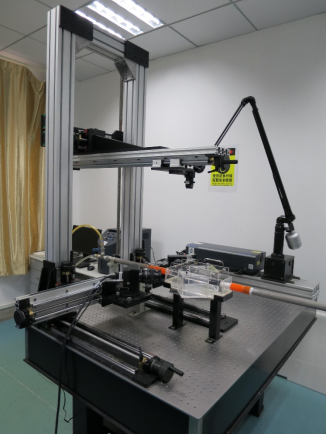I. History of Development

The Department of Engineering Thermophysics in the School of Energy and Power Engineering at Huazhong University of Science & Technology was founded in 1953. The Department of Engineering Thermophysics has made significant achievements in education and in scientific research during the past 60 years. The Ph.D. program was established since 1984. The first post-doctoral research station was established in 1991. In 2007, Engineering Thermophysics were honored as a primary subject of State Key Discipline. The Department of Engineering Thermophysics had won several major nationwide awards, including the Second prize of the State Natural Science Award(2020), the Second prize of the National Technological Invention Award(2004, 2016), the First Prize of the Technological Invention Award of the Ministry of Education (MOE), and the Science and Technology Advancement Award, the First Prize of the Provincial Technological Invention Award and Science and Technology Award(2016). Over the last five years, faculty in the department had published more than 300 SCI cited papers.
II. Faculty
There are currently 27 faculty and staff members in the Department, including 14 professors, 12 associate professors and 1 lecturers. Among them there is 1 winner of Distinguished Young Scholar awarded by National Natural Science Foundation of China (NSFC), 2 winners of Chutian Scholars of the Hubei Province.
Professors:
Wei Liu Xiaobing Luo Ronggui Yang Haisheng Fang Zhichun Liu Nuo Yang Fan Aiwu Kun Yang Tianhua Wu Guoliang Xu Dehuan Liu Puqing Jiang Xiaoming Huang Xin Qian
Associate Professors:
Yan Long Jing Wu Xiaobo Li Run Hu Rui Long Xiuliang Liu Zhaohui Shu Yixin Lin Dongwei Xu Bin Yao Yiqing Du Fang Yuan
Lectures:
Jinlong Ma
III. Research Areas
1. Enhanced Heat Transfer Theory and Energy-saving Technology
Manipulating heat transfer processes are pivotal for improving the efficiency of energy conversion systems. This research track focuses on studying the theory of enhanced heat transfer, aiming at unraveling the mechanisms of multiphase flow, and optimizing the thermodynamic cycles for heat recovery on the system level. Research topics include but not limited to: (1) Mechanisms of enhanced heat transfer; (2) Development of heat exchangers with high efficiency; (3) Multiphase flow; (4) Irreversible thermodynamics and thermodynamic cycles for waste heat recovery; (5) Building energy efficiency.
2. Lighting-emitting Diode Packaging and Applications
Thermophysics and hydrodynamics are two important aspects of light-emitting diode (LED) packaging that determine the reliability, lifetime and lighting performance of high-power LED devices. This research track aims at tackling the challenging technological bottlenecks to enhance the lighting performance, to contain the junction temperature, and to achieve high reliability, long lifetime, and superb lighting performance of LED devices. Research directions include but not limited to: (1) Packaging processes and design optimization; (2) Heat dissipation and study of the coupled optothermal physics; (3) Optical designs for wide range of advanced applications; (4) Quantum-dot LED packaging.
3. Thermal management theory and technologies
The thermal bottleneck has become the key concern for the performance, reliability, and safety for devices including power electronics, lithium ion batteries, and high-power optoelectronic devices. The aim of this area is to reveal the mechanisms of heat generation and thermal transport processes inside the aforementioned devices. Research is being performed to develop theories and technological solutions for efficient heat removal. Research topics along this track include (1) Thermal designs for LEDs, battery, chips, etc., (2) Micropump for liquid cooling, (3) Thermal storage with phase change materials, (4) Thermal interface materials, (5) Thermal management at high-temperature and high-pressure, (6) Theoretical and experimental investigations of Loop Heat Pipe (LHP) and Capillary Pumped Loop (CPL).
4. Microscale/Nanoscale heat transfer and combustion
Fundamental understanding of thermal energy transport, storage, and conversion from multiscale point of view is essential not only for resolving the thermal bottleneck for a wide range of applications, but also for pushing forward the scientific frontiers and for cultivating future technological breakthrough. Research in the department ranges from the quantum-molecular scales to the macroscale, from theoretical simulations including first principles calculations, molecular dynamics simulations, Monte-Carlo simulations, etc., to experimental measurements including three-omega methods, ultrafast-laser based pump-probe measurements, and thermal property microscopy. Research directions include but not limited to: (1) Phonon transport physics in semiconductor materials and nanocomposites, as well as low-dimensional material systems and quantum materials; (2) multi-carrier transport and energy conversion, including electron-phonon interactions, coupled ionic-thermal energy transport, light-matter interaction, etc.; (3) device-level heat generation and thermal transport, including heat dissipation dynamics in nanosctructures and across interfaces;(4) discovery and design of materials with superb thermal properties, including thermoelectric materials, phase change materials, thermal barrier coatings, materials with extreme thermal conductivities and thermopowers, etc. (5) Multiscale and multiphysics modeling of transport and energy conversion processes; and (6) Micro-/ meso-scale combustion physics.
5. Renewable energy
To achieve the goal of neutralizing carbon emission by 2060, our department is devoted to developing technologies to provide renewable energy sources, contributing to the establishment of next-generation green-energy network. This research track focuses on novel advanced energy materials, green-energy systems, energy storage technologies, and evaluation frameworks for the energy efficiency, economics, and technological readiness. Major research directions include: (1) Solar energy utilization such as solar-heat power plants, thin-film solar cells, etc. (2) Biomass energy utilization and photobioreactor optimization (3) photocatalytic conversion of CO2 (4) waste-heat energy conversion and storage, including organic-Rankine cycles, large-scale thermal storage systems, and low-grade heat harvesting technologies (5) energy economics and management.






